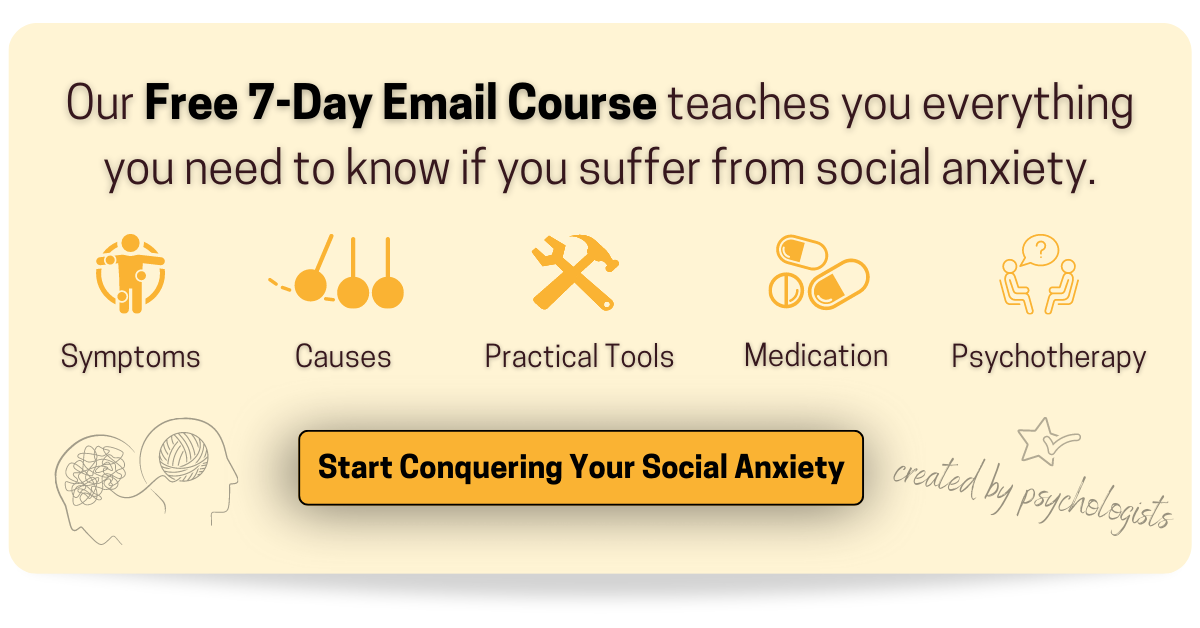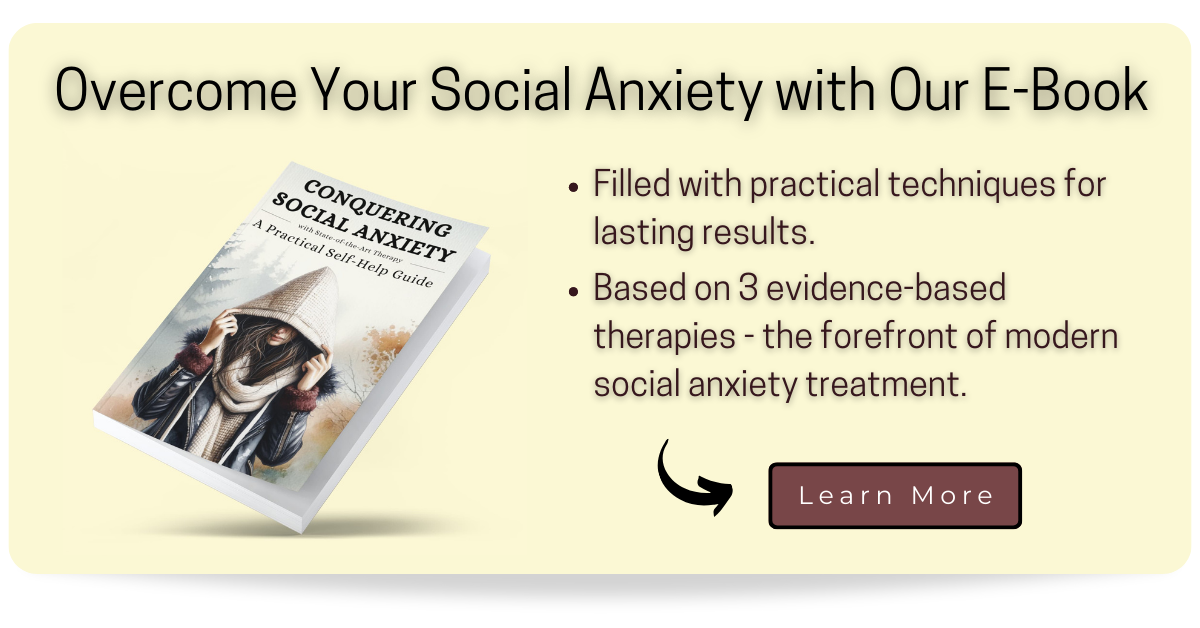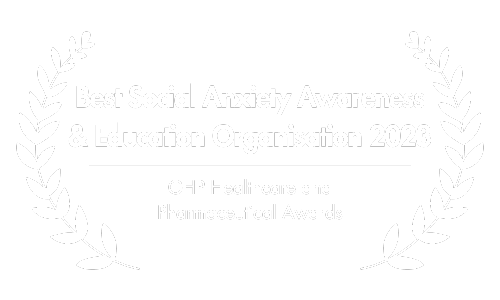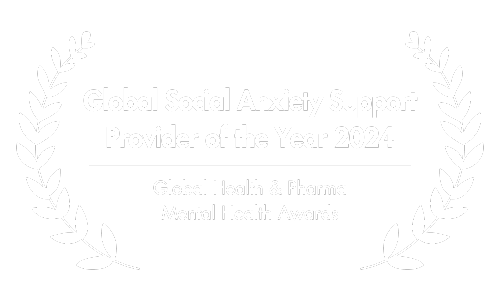Prescription for Confidence: A Guide to SSRI Treatment for Social Anxiety
This article features a suggestion for an online psychiatry service, where certified mental health experts can assess social anxiety, offer diagnoses, and prescribe medications if appropriate. By using this link, you may receive a significant discount on the service, and we will earn a commission.

Living with social anxiety can be challenging, impacting various aspects of life, from personal relationships to professional opportunities. However, there is hope for finding relief and regaining confidence.
Medication, alongside therapy and lifestyle modifications, plays a crucial role in treating social anxiety. Among the various options, SSRIs (Selective Serotonin Reuptake Inhibitors) stand out as a commonly prescribed class of medications for social anxiety.
In this article, we will delve into the transformative power of SSRIs in effectively managing social anxiety.

We will explore the mechanisms by which these medications work, their proven effectiveness in alleviating symptoms, and essential considerations to keep in mind along the way
By shedding light on the use of SSRIs, we aim to empower you to make informed decisions and embark on a path towards greater well-being and social ease.
Remember to consult with a healthcare professional for personalized guidance in determining the most suitable treatment plan for your unique needs.
Let’s get started.

A. What are SSRIs?
SSRIs, or Selective Serotonin Reuptake Inhibitors, belong to a class of antidepressant medications that have been extensively studied and recognized as the first-line medication for social anxiety disorder (Melaragno, 2021).
Do not be confused by the term ‘antidepressant’ as SSRIs, although initially developed to treat depression, have been found to also have positive effects on anxiety conditions (Cassano et al., 2002).
Since the 1980s, researchers have extensively studied the potential of SSRIs to treat social anxiety disorder after recognizing their positive effects on symptoms in affected individuals.

How SSRIs Alleviate Social Anxiety
SSRIs, like other antidepressants, function by inhibiting the reuptake of serotonin, an essential neurotransmitter in the brain.
Under normal circumstances, serotonin is released by neurons and then reabsorbed. However, SSRIs interfere with this reuptake process, allowing serotonin to stay in the synaptic gap between neurons for a longer duration.
While the exact mechanism by which SSRIs reduce social anxiety is not fully understood, it is believed that this prolonged presence of serotonin enhances inter-neuronal communication and regulates mood, ultimately reducing the symptoms of anxiety associated with social anxiety disorder (Kinney et al., 2022).

Furthermore, serotonin is known to play a role in regulating the amygdala, a brain region involved in fear and anxiety responses. It is hypothesized that SSRIs may dampen amygdala activity, reducing the exaggerated fear response associated with social anxiety.
To gain a deeper understanding of the role of serotonin in social anxiety, we encourage you to click here to explore our comprehensive article on the topic. It delves into the significance of serotonin in relation to social anxiety and provides practical guidance on natural methods to enhance serotonin levels.
Types of Symptoms Alleviated by SSRIs
By modulating serotonin levels in the brain, these medications target and alleviate specific manifestations of social anxiety (Alomari et al., 2022), such as:
Excessive Fear and Anxiety
SSRIs help mitigate the overwhelming fear and anxiety that individuals with social anxiety often face. By regulating serotonin levels, these medications promote a more balanced mood and reduce the intensity of fearful responses to social situations.
Self-Consciousness
Social anxiety can be characterized by heightened self-consciousness, leading to feelings of embarrassment and self-doubt.
SSRIs can help alleviate these symptoms by modulating serotonin pathways involved in self-perception and self-esteem, enabling individuals to feel more at ease in social interactions.
Avoidance of Social Situations
Individuals with social anxiety commonly engage in avoidance behaviors to circumvent distressing social situations. SSRIs can help reduce the urge to avoid social interactions by regulating serotonin levels and diminishing the associated anxiety.
This can lead to increased willingness to engage in social activities and a broader range of experiences.

As you can see, SSRIs play a pivotal role in alleviating a range of symptoms associated with social anxiety disorder, including excessive fear, self-consciousness, and avoidance behavior.
By restoring equilibrium to mood and fostering a sense of relaxation, these medications offer significant relief, enabling individuals to approach social situations with enhanced comfort and confidence.
Common SSRIs Prescribed for Social Anxiety Disorder
Several SSRIs are commonly prescribed to individuals with social anxiety disorder. The most common examples include sertraline (Zoloft), fluoxetine (Prozac), and paroxetine (Paxil). These medications are typically taken orally in the form of tablets or capsules.

Sertraline (Zoloft)
Sertraline is an SSRI known for its efficacy in treating social anxiety disorder (Liebowitz et al., 2003).
It not only increases serotonin levels but also has a unique action on dopamine reuptake inhibition, which may contribute to its mood-enhancing effects.
Sertraline is often favored for its tolerability and fewer drug interactions compared to other SSRIs.
Fluoxetine (Prozac)
Fluoxetine has demonstrated efficacy in reducing symptoms of social anxiety and is among the most commonly prescribed SSRIs (Ameringen & Streiner, 1993).
It has a long half-life, which means it remains in the body for an extended period. This property allows for less frequent dosing, making it convenient for individuals who prefer less frequent medication administration.
Fluoxetine is also available in a delayed-release formulation, which can help reduce the risk of missed doses.

Paroxetine (Paxil)
Paroxetine is an SSRI that is highly effective in managing social anxiety symptoms (Book et al., 2009).
It has a relatively short half-life, which means it is quickly eliminated from the body. This property can be advantageous for individuals who may experience side effects or want to discontinue the medication.
Additionally, paroxetine may have more potent anticholinergic effects compared to other SSRIs, which can be helpful for individuals with coexisting symptoms of anxiety and depression.

In addition to the options mentioned above, there are other SSRIs that are commonly prescribed for social anxiety disorder. Some of these include:
Escitalopram (Lexapro)
Escitalopram is an SSRI that is frequently prescribed for social anxiety disorder due to its efficacy (Stein et al., 2004).
It works by increasing serotonin levels in the brain and has shown effectiveness in reducing social anxiety symptoms. Escitalopram is generally well-tolerated and has a favorable side effect profile.
Citalopram (Celexa)
Citalopram is another effective SSRI that is often used in the treatment of social anxiety disorder (Varia et al., 2002).
It functions by inhibiting serotonin reuptake, leading to increased serotonin levels in the brain. Citalopram has been shown to be effective in reducing social anxiety symptoms and is available in oral tablet form.
Fluvoxamine (Luvox)
Fluvoxamine is a well-tolerated SSRI that is sometimes prescribed for social anxiety disorder.
It works by selectively inhibiting serotonin reuptake and has been found to be effective in reducing social anxiety symptoms (Irons, 2005). Fluvoxamine is available in immediate-release and extended-release formulations.
These are just a few examples of other SSRIs that may be prescribed for social anxiety disorder. The choice of SSRI depends on various factors, including individual response, tolerability, and specific considerations determined by a healthcare professional.

B. Effectiveness of SSRIs for Social Anxiety
SSRIs have been extensively studied for their effectiveness in treating social anxiety.
Several research studies and clinical trials have provided valuable insights into the benefits of SSRIs in reducing social anxiety symptoms.
Scientific Evidence Regarding SSRIs for Social Anxiety
Randomized, double-blind, placebo-controlled trials reviewed by van der Linden, Stein, and van Balkom (2000) showed higher response rates and larger effect sizes for SSRIs compared with placebo in the treatment of social phobia.
In addition, another meta-analysis by Mitsui et al. (2022) found that SSRIs differed significantly from placebo in both response rates and reductions in symptoms of social anxiety.

In said review, it was found that individuals treated with SSRIs had a significantly higher rate of improvement (62%) than individuals receiving placebo.
In addition, this meta-analysis found that groups treated with SSRIs had an average decrease of 9.65 points on the Liebowitz Social Anxiety Scale.
The Liebowitz scale measures the severity of social anxiety symptoms, and a score reduction of nearly 10 points indicates a substantial reduction in social anxiety symptoms.

A comprehensive systematic review and meta-analysis of 57 studies compared the effectiveness of SSRIs in treating various anxiety disorders (Jakubovski et al. 2019).
The results show that people with social phobia receive the greatest overall benefit from SSRI treatment compared with people with other anxiety disorders, with higher doses leading to greater treatment success.
Taken together, there is strong evidence that SSRIs can effectively alleviate social anxiety symptoms.
Benefits and Limitations
Upon reviewing these findings, it becomes evident that the utilization of SSRIs for social anxiety treatment can provide numerous advantages and favorable outcomes.
As already mentioned, SSRIs are considered a first-line treatment option due to their demonstrated efficacy and tolerability profiles (Canton, Scott, & Glue, 2012).

However, it is important to consider the limitations associated with SSRIs, as individual responses may vary, and not all individuals may experience the same level of improvement.
Additionally, SSRIs may have potential side effects, although they are typically mild and transient. We will dive deeper into these limitations in the next section.
Please keep in mind that it is important to weigh the potential benefits and limitations in consultation with a healthcare professional to determine the most appropriate treatment approach for your social anxiety.

C. Considerations and Precautions
Consulting a Healthcare Professional
It is crucial to consult a healthcare professional for a proper diagnosis and prescription when considering SSRIs for the treatment of social anxiety.
A healthcare professional, such as a psychiatrist or a primary care physician, can accurately assess the your condition, determine the appropriate medication, and monitor the treatment progress.
They will take into account factors such as the severity of your social anxiety, medical history, and potential interactions with other medications.

You can conveniently schedule an online appointment with a qualified psychiatrist, licensed in your state, through our following partner-link, which gives you an $80 discount.
The psychiatrists from Talkspace can provide a comprehensive evaluation, offer a diagnosis if applicable, and prescribe medication, such as beta-blockers, if deemed appropriate for your specific needs.
Your prescription will be sent to a local pharmacy of your choice. Every three months you’ll have a follow-up video appointment, and you can message your provider any time.
Prescription treatment with Talkspace costs you about $30/month if you are insured, and about $60-$100/month when you pay out-of-pocket. Remember, through our link you will get a special coupon code.
Common Side Effects and Management
Like any medication, SSRIs can have side effects. It is important to be aware of them and understand how to manage them.
Common side effects of SSRIs may include:
- nausea,
- headache,
- dizziness,
- drowsiness,
- sexual dysfunction,
- and gastrointestinal disturbances.
However, it is important to note that not everyone experiences these side effects, and they may vary in severity and duration.
If you experience side effects that significantly affect your daily functioning or well-being, it is essential to communicate with your healthcare professional.

Your doctor may be able to adjust the dosage, switch to a different SSRI, or provide strategies to manage the side effects you are experiencing.
It is crucial not to discontinue SSRIs abruptly without medical guidance, as this can lead to withdrawal symptoms.
Drug Interactions and Precautions
When taking SSRIs, it is important to be aware of potential drug interactions and precautions.
SSRIs may interact with certain medications, including other antidepressants, migraine medications, blood thinners, and some herbal supplements. These interactions can affect the effectiveness or safety of both the SSRIs and other medications.
To ensure safety and effectiveness, you should inform your healthcare professional about all the medications you are taking, including prescription drugs, over-the-counter medications, and supplements.
Your doctor can assess potential interactions and make appropriate adjustments to the treatment plan if necessary.

Additionally, certain precautions should be taken when starting or discontinuing SSRIs. Gradual dosage adjustments, as advised by the healthcare professional, can help minimize withdrawal symptoms when stopping SSRIs.
By considering these precautions and consulting with a healthcare professional, you can optimize the benefits of SSRIs while minimizing potential risks and ensuring a safe and effective treatment journey for your social anxiety.

D. Treatment Duration and Adjustments
Duration to Experience Full Effects
The effects of SSRIs on social anxiety symptoms may not be immediate. It typically takes several weeks for individuals to start experiencing the full benefits of the medication.
During this period, it is important to continue taking the prescribed dosage as directed by your healthcare professional, even if noticeable improvements are not immediately apparent. Patience and consistency are key during this phase.

Duration of SSRI Treatment for Social Anxiety
The duration of SSRI treatment for social anxiety varies depending on individual factors and treatment response. Typically, SSRIs are prescribed for a significant period, often several months or longer.
It is important to note that medication alone is usually not considered a standalone treatment for social anxiety disorder. SSRIs are often administered in conjunction with therapy, which can yield positive results and potentially lead to discontinuation of the SSRI treatment.
The decision to discontinue medication should always be made in consultation with a healthcare professional, considering individual needs and treatment progress.
Regular communication with your doctor is essential to evaluate the effectiveness of the combined treatment approach and determine the most appropriate duration of SSRI use.

Regular Follow-ups and Dosage Adjustments
Regular follow-up appointments with your doctor are essential when taking SSRIs. These appointments allow for the monitoring of treatment progress, evaluation of symptom improvement, and assessment of any potential side effects.
Based on your response to the medication, the healthcare professional may make adjustments to the dosage or treatment plan to optimize effectiveness and minimize side effects.

Open communication with your doctor is crucial. You should openly discuss any concerns, questions, or changes in symptoms during these follow-up appointments.
This collaborative approach ensures that the treatment remains tailored to your needs and helps achieve the best possible outcomes.
Patience and Adherence to the Treatment Plan
Managing social anxiety with SSRIs requires patience and adherence to the prescribed treatment plan. It is important to remember that everyone’s response to medication can vary.
Some individuals may experience significant improvements earlier, while others may require a longer duration to notice substantial changes.
Adhering to the prescribed treatment plan includes taking the medication as directed, attending follow-up appointments, and following any additional recommendations provided by the healthcare professional.
Stopping or adjusting the medication without medical guidance can disrupt the treatment process, lead to aversive symptoms, and may not lead to the desired outcomes.

It is also important to maintain realistic expectations and understand that SSRIs are not a “quick fix.”
With patience, adherence to the treatment plan, and ongoing support, you can maximize the benefits of SSRIs in effectively managing your social anxiety.
E. Other Treatment Options
Complementary Treatments
While SSRIs are an effective treatment option for social anxiety, they can be complemented by other interventions to enhance the overall management of the condition.
Therapy, such as cognitive-behavioral therapy (CBT), can provide valuable tools and techniques for addressing the underlying causes of social anxiety and developing coping strategies. For more about CBT, you can click here to read our introductory guide on CBT for social anxiety.
Other therapeutic approaches, such as exposure therapy or mindfulness-based practices, may also be beneficial in reducing anxiety symptoms and improving overall well-being.

Additionally, incorporating lifestyle changes can contribute to the overall management of social anxiety.
Engaging in regular physical exercise, practicing stress reduction techniques like meditation or deep breathing exercises, maintaining a healthy diet, and prioritizing self-care can all have a positive impact on mental health and well-being.
For a comprehensive collection of 20 practical tips and exercises designed to help reduce social anxiety, we invite you to click here to read our dedicated article. Each recommendation is accompanied by a downloadable PDF guide, providing you with valuable resources to support your journey towards managing social anxiety.
By combining SSRIs with therapy and lifestyle changes, you can create a comprehensive and personalized approach that addresses various aspects of your well-being.

If you have reservations about taking medication for social anxiety, whether due to personal preferences or concerns about potential side effects, you may be interested in exploring natural alternatives.
One such option is CBD, which has shown promising results as a natural alternative with a more favorable side-effect profile. To learn more, simply click here to be taken to our article on CBD for social anxiety.
Remember, each individual is unique, and finding the right combination of treatments may require some trial and error.
Consulting with a healthcare professional and working collaboratively to create an individualized treatment plan is crucial for achieving the best possible outcomes in managing social anxiety.

F. Conclusion
- SSRIs have emerged as a powerful tool in the management of social anxiety. Through their ability to reduce social anxiety symptoms, SSRIs offer hope and relief to individuals struggling with this condition.
- The effectiveness of SSRIs in alleviating social anxiety has been supported by numerous research studies and clinical trials. They have consistently shown improvements in response rates and reductions in social anxiety severity, providing evidence of their potential benefits.
- It is essential to remember that seeking professional guidance is crucial when considering SSRIs or any other treatment for social anxiety. Consulting a healthcare professional ensures an accurate diagnosis, personalized treatment recommendations, and proper monitoring of progress.
- By working closely with a healthcare professional and exploring a holistic approach that may include therapy and lifestyle changes, you can empower yourself to overcome social anxiety and lead a more fulfilling life.

Additional Resources on Medication for Social Anxiety Disorder
We also invite you to click here to access our comprehensive guide to medication options for social anxiety disorder. This guide provides valuable insight and information to help you make informed decisions about your treatment.
You can also click here to learn how beta blockers can help combat the physical symptoms of social anxiety, or here to learn about the benefits and potential complications of benzodiazepines for social phobia.
If you’d like to learn more about another first-line medication for social anxiety, you can click here to explore SNRIs (which are very similar in nature to SSRIs).
If you’d like to learn more about two less common but also effective options for social anxiety, click here to read more about MAOIs for social phobia, or here to learn more about RIMAs.
Remember, you are not alone on this journey. Reach out for support, be patient with the process, and stay committed to your well-being.

Participate in a Research Study!
If you are affected by social anxiety, you can help researchers and clinicians better understand the condition and improve treatment efficacy by participating in a research study.
To take part, you can click here to open a short, quick survey in a new browser window, or simply fill out the form provided below. Thank you for your participation!
Alomari, N. A., Bedaiwi, S. K., Ghasib, A. M., Kabbarah, A. J., Alnefaie, S. A., Hariri, N., Altammar, M. A., Fadhel, A. M., & Altowairqi, F. M. (2022). Social Anxiety Disorder: Associated Conditions and Therapeutic Approaches. Cureus, 14(12), e32687. https://doi.org/10.7759/cureus.32687
Book, S. W., Thomas, S. E., Randall, P. K., & Randall, C. L. (2008). Paroxetine reduces social anxiety in individuals with a co-occurring alcohol use disorder. Journal of anxiety disorders, 22(2), 310–318. https://doi.org/10.1016/j.janxdis.2007.03.001
Canton, J., Scott, K. M., & Glue, P. (2012). Optimal treatment of social phobia: systematic review and meta-analysis. Neuropsychiatric disease and treatment, 8, 203–215. https://doi.org/10.2147/NDT.S23317
Cassano, G. B., Baldini Rossi, N., & Pini, S. (2002). Psychopharmacology of anxiety disorders. Dialogues in clinical neuroscience, 4(3), 271–285. https://doi.org/10.31887/DCNS.2002.4.3/gcassano
Irons J. (2005). Fluvoxamine in the treatment of anxiety disorders. Neuropsychiatric disease and treatment, 1(4), 289–299.
Jakubovski, E., Johnson, J. A., Nasir, M., Müller-Vahl, K., & Bloch, M. H. (2019). Systematic review and meta-analysis: Dose-response curve of SSRIs and SNRIs in anxiety disorders. Depression and anxiety, 36(3), 198–212. https://doi.org/10.1002/da.22854
Kinney, K. L., Burkhouse, K. L., Chang, F., MacNamara, A., Klumpp, H., & Phan, K. L. (2021). Neural mechanisms and predictors of SSRI and CBT treatment of anxiety: A randomized trial focused on emotion and cognitive processing. Journal of anxiety disorders, 82, 102449. https://doi.org/10.1016/j.janxdis.2021.102449
Liebowitz, M. R., DeMartinis, N. A., Weihs, K., Londborg, P. D., Smith, W. T., Chung, H., Fayyad, R., & Clary, C. M. (2003). Efficacy of sertraline in severe generalized social anxiety disorder: results of a double-blind, placebo-controlled study. The Journal of clinical psychiatry, 64(7), 785–792. https://doi.org/10.4088/jcp.v64n0708
Melaragno A. J. (2021). Pharmacotherapy for Anxiety Disorders: From First-Line Options to Treatment Resistance. Focus (American Psychiatric Publishing), 19(2), 145–160. https://doi.org/10.1176/appi.focus.20200048
Mitsui, N., Fujii, Y., Asakura, S., Imai, H., Yamada, H., Yoshinaga, N., Kanai, Y., Inoue, T., & Shimizu, E. (2022). Antidepressants for social anxiety disorder: A systematic review and meta-analysis. Neuropsychopharmacology reports, 42(4), 398–409. https://doi.org/10.1002/npr2.12275
Stein, D. J., Kasper, S., Andersen, E. W., Nil, R., & Lader, M. (2004). Escitalopram in the treatment of social anxiety disorder: analysis of efficacy for different clinical subgroups and symptom dimensions. Depression and anxiety, 20(4), 175–181. https://doi.org/10.1002/da.20043
Van Ameringen, M., Mancini, C., & Streiner, D. L. (1993). Fluoxetine efficacy in social phobia. The Journal of clinical psychiatry, 54(1), 27–32.
van der Linden, G. J., Stein, D. J., & van Balkom, A. J. (2000). The efficacy of the selective serotonin reuptake inhibitors for social anxiety disorder (social phobia): a meta-analysis of randomized controlled trials. International clinical psychopharmacology, 15 Suppl 2, S15–S23. https://doi.org/10.1097/00004850-200008002-00004
Varia, I. M., Cloutier, C. A., & Doraiswamy, P. M. (2002). Treatment of social anxiety disorder with citalopram. Progress in neuro-psychopharmacology & biological psychiatry, 26(1), 205–208. https://doi.org/10.1016/s0278-5846(01)00236-6

About the Author: Martin Stork
Martin is a professional psychologist with a background in physical therapy. He has organized and led various support groups for people with social anxiety in Washington, DC and Buenos Aires, Argentina. He is the founder of Conquer Social Anxiety Ltd, where he operates as a writer, therapist and director. You can click here to find out more about Martin.












